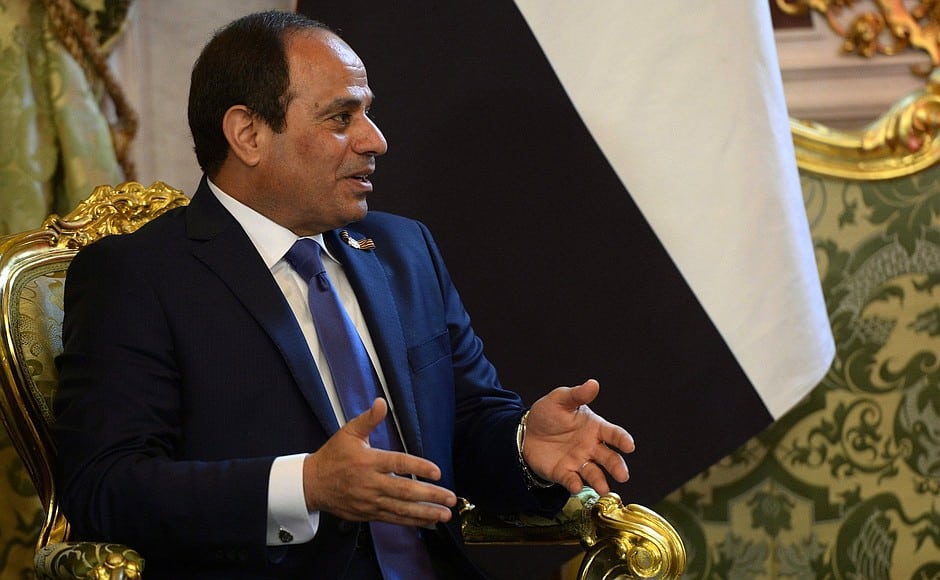Egyptian President Abdel Fattah el-Sisi secured his second term in the presidential elections between 26 and 28th March. According to official results, Sisi received 97% of the votes. His only opponent, Moussa Moustafa Moussa, received only 3%, while 7% of the ballots were invalid. The voter turnout was, with only 41%, the lowest since the revolution in 2011 and six percent lower than four years ago. The turnout is a sign of disaffection with the current authoritarian political system. Systematic government repression of the opposition and media resulted in only one ‘opponent’ remaining on the ballot.
Pre-election crackdown on candidates
The pre-election period was marked by large scale repression of political opponents, activists and journalists. The crackdown on any potential opposition candidate began in December 2017. Around that time former Prime Minister Ahmed Shafik returned to Egypt with the intent to run for president. However in early January he dropped out the race. Claiming that “I have seen that I will not be the ideal person to lead the state’s affairs during the coming period. Thus I have decided not to run in the upcoming 2018 presidential elections.’’ Other opponents also dropped out of the race. Human rights activists Khaled Ali and Anwar Essmat Sadat, nephew of late President Anwar Sadat, claimed to be pressured by agents of the National Security Agency.
Most analysts however agreed that the real challenge to Sisi’s rule came from within Egypt’s security apparatus. “[this election is a] internal power struggle among the military and the regime’s security services, and it has nothing to do with democratic mechanisms worthy of the name.’’ according Egyptian political analyst Sara Khorshid. All military challengers were ousted from the race. Colonel Ahmed Konsowa, who had shown the intent to run, was sentenced to six years in prison for “actions that undermine the system’’. Another military strongman, General Sami Anan, was also arrested and convicted in January after he announced his candidacy.
Campaign and election
With no real opposition, the regime wanted to make the elections look as legitimate as possible by boosting the voter turnout. In reaction to critical reporting by foreign media, state controlled news outlets launched a campaign denouncing foreign journalists as “forces of evil”. Egypt’s prosecutor-general vowed to take every legal step necessary in order to safeguard the elections from “fake news’’. Not going to the polls or voting with an invalid ballot was presented by several outlets as a crime against the state. Even stating that voters would receive rewards, while those who decline would be fined. Despite the intense campaign to get people out to the polls, the voter turnout seemed to signal the disaffection of the public with the current regime. Economic stagnation and the disillusionment with the political process, alienated voters. Especially the Egyptian youth.
In this hostile environment several activists and journalists were arrested for “undermining the electoral process’’. Abdul Moneim Aboul Fotouh, a leading figure in the Strong Egypt Party (SEP), called for the boycott of the election, citing the undemocratic nature of the process. The authorities arrested several leading members of the SEP in reaction to this boycott. Journalists writing critical pieces related to these developments were harassed or arrested. Even Western journalists were being repressed in the country.
Sisi denied all accusations of a repressive campaign. Claiming that he “prayed to God’’ for more opponents. In reality Sisi created an image of the “undefeatable hero” in the state media. A move that his critics called a “cult of personality”. One of the trademarks of this media campaign was hailing Sisi as the “defeater of terrorism”. Leading up to the campaign Egypt intensified its anti-terrorists operations in the Sinai. The enormous attention that Sisi enjoyed was contrasted by the almost non-existing campaign of his opponent. Moussa only rarely appeared in public and never attacked Sisi on his policies.
An authoritarian future
The authoritarian characteristics of the regime are only the latest signs of the deterioration of democracy in Egypt. After the disposal of democratically elected president Mohammed Morsi in 2013, there has been a systematic crackdown on freedoms according to Human Rights Watch. Sisi relies on continued support from the “deep state”, which includes the military, the bureaucracy and the judiciary – and its supporters. As long as Sisi has the support from these elements of the state, he will remain in power. One way Egyptian president’s traditionally have enjoyed this support is by awarding great wealth to the military. Economic experts estimate the military’s holdings at anywhere between 5% and 60% of the economy.
There are still road blocks ahead for the power hungry regime in the coming years. Sisi wants to legitimize his rule by the veil of democratic elections. Under the current constitution, Sisi’s second term would be his last. Therefore several MP’s already introduced the idea of constitutional amendments that would lift the presidential term and clearing the road for a president for life.
International reactions
The Egyptian turn towards authoritarian rule and the sham election are watched with some restrains in the West. The United States congratulated Sisi with his “victory”, while noticing “constraints on freedoms of expression and association in the run-up to the elections”. Other Western leaders send congratulatory messages to Sisi, leading to fears criticism of human rights organizations.
Analysts argue that the West doesn’t want to provoke Egypt. The country is relatively stable comparted to other Arab countries in the region. Furthermore is Cairo one of the main allies in the fight against fundamentalist Islamic terrorism. Making it unlikely that pressure on the regime will come from the outside.
Sources: Al Jazeera I Al Jazeera II Al Jazeera III New York Times Washington Post

